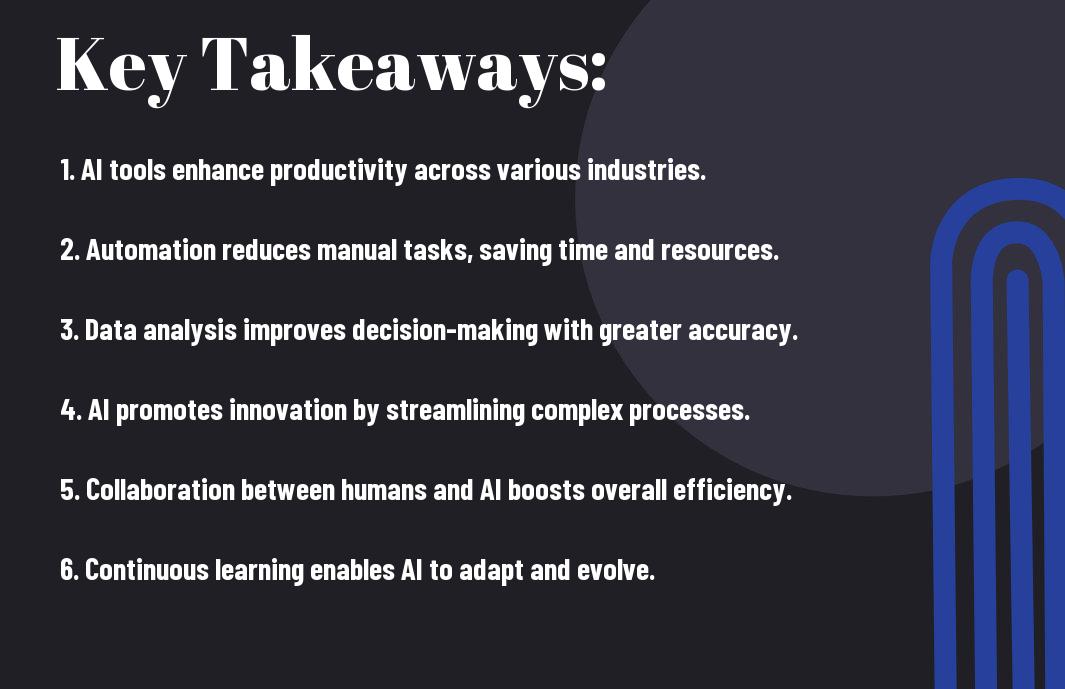Can AI-Based Tools Alleviate Human Endeavors Through Exponential Efficiency?
Most modern businesses and individuals are constantly on the lookout for ways to streamline their processes and improve productivity. AI-based tools have emerged as powerful allies, capable of transforming your daily tasks into seamless operations characterized by exponential efficiency. In this blog post, you will explore how these intelligent systems can enhance your work-life balance, cut down on repetitive tasks, and ultimately allow you to focus on what truly matters. Discover how leveraging artificial intelligence can not only alleviate your workload but also amplify your potential in achieving your goals.
Key Takeaways:
- Automation Potential: AI-based tools can significantly enhance productivity by automating repetitive tasks, allowing humans to focus on more complex and creative endeavors.
- Data Analysis: These tools excel at processing vast amounts of data quickly, offering insights that can drive better decision-making and strategy formulation.
- Personalization: AI technologies can deliver highly personalized experiences in various sectors, from marketing to customer service, improving user satisfaction and engagement.
- Cost Efficiency: By reducing the time and resources required for certain tasks, AI tools can lower operational costs, providing financial relief for businesses and individuals alike.
- Scalability: Organizations can leverage AI tools to scale their operations efficiently, adapting to changing demands without compromising quality or speed.

Understanding AI-Based Tools
The landscape of technology has evolved significantly, and AI-based tools are at the forefront of this revolution. These sophisticated instruments harness algorithms and data analysis to enhance productivity, streamline processes, and innovate solutions in various sectors. As a savvy user, you can leverage these tools for more effective outcomes in your personal and professional tasks.Can AI-Based Tools Alleviate Human Endeavors Through Exponential Efficiency?
Definition and Types of AI Tools
AIBased tools encompass a wide array of applications designed to perform tasks that typically require human intelligence. They can be classified into several categories, including:
- Machine Learning
- Natural Language Processing
- Computer Vision
- Robotics
- Expert Systems
Recognizing the diverse functionalities they provide can help you choose the right tool for your needs.
| Type of AI Tool | Description |
|---|---|
| Machine Learning | Algorithms that improve through experience. |
| Natural Language Processing | Understanding and generating human language. |
| Computer Vision | Processing and analyzing visual data. |
| Robotics | Automating physical tasks with machines. |
| Expert Systems | Simulating human decision-making capabilities. |
Historical Context and Development
For you to understand the significance of AI-based tools today, it’s vital to explore their historical background. The roots of artificial intelligence trace back to the mid-20th century, when pioneers began conceptualizing machines that could mimic human cognitive functions.
In addition, milestones such as the invention of neural networks and natural language processors in the 1980s paved the way for modern AI tools. The introduction of big data and improved computational power in the 21st century further accelerated AI development, making these tools more accessible and effective for everyday use. As you engage with these technologies, recognizing their evolutionary journey allows you to appreciate their capabilities and potential impact on your endeavors.
The Concept of Exponential Efficiency
There’s a paradigm shift occurring in productivity brought about by artificial intelligence and its capacity to enhance human endeavors. Exponential efficiency refers to a leap in output that far surpasses traditional linear improvements, allowing you to achieve tasks at an unprecedented scale and speed. By leveraging AI, you can transform how you work, enabling a significant increase in effectiveness with reduced time investment.
What is Exponential Efficiency?
About exponential efficiency, this concept embodies the idea of achieving results that are not just incrementally better but dramatically superior. It focuses on maximizing output while minimizing the inputs required, which can lead to monumental changes in how you approach tasks and challenges.
Comparisons with Traditional Methods
With AI-based tools, your methods can shift from conventional practices to a more optimized approach. Here’s a breakdown comparing traditional methods and exponential efficiency frameworks:
Comparison of Efficiency
Traditional MethodsExponential EfficiencyLinear progressRapid scaling of resultsTime-consuming tasksAutomated processesManual data entryAI-driven insights
In fact, the shift from traditional methods to exponential efficiency represents a revolution in your workflow. By using AI tools, tasks that once took hours can now be completed in minutes. The automated nature of these tools minimizes the potential for human error, while the data analysis capabilities allow you to make better-informed decisions faster than ever. This not only saves you time but also enhances the quality of your output, reinforcing the benefits of adopting AI integration in your everyday processes.
Traditional vs. Exponential Processes
Traditional ProcessesExponential ProcessesStatic workflowsDynamic, adaptable systemsLimited scalabilityUnlimited growth potentialReactive strategyProactive optimization
Applications of AI in Various Sectors
Despite its early development, AI is now permeating various sectors, driving unprecedented efficiency and innovation. As highlighted in the Top 20 ways Artificial Intelligence is advancing life sciences, industries like healthcare, manufacturing, and education are leveraging AI to enhance performance and outcomes, reshaping how you engage with these fields.
Healthcare Innovations
About the healthcare sector, AI technologies are redefining patient care and medical research. By harnessing AI algorithms, healthcare providers can analyze vast amounts of data to improve diagnostics, personalize treatment plans, and predict patient outcomes, effectively transforming your experience as a patient or healthcare professional.
Automation in Manufacturing
Below, the manufacturing industry is experiencing a significant transformation through automation driven by AI. These tools optimize production processes by reducing errors, increasing output, and enhancing quality control, allowing you to achieve a more streamlined and efficient operation.
Further, AI-powered robots and predictive maintenance systems ensure minimal downtime, enabling your manufacturing processes to maintain a competitive edge. By implementing AI, you can enhance resource allocation, leading to cost reductions and improved productivity in your operations.
AI in Education and Learning
About education, AI offers innovative tools that personalize the learning experience for students. AI-driven platforms adapt to individual learning styles, helping you as a learner or educator to facilitate more effective educational outcomes.
For instance, through the use of AI chatbots and intelligent tutoring systems, you can experience real-time support tailored to your queries, making learning more accessible and engaging. This personalized approach enhances retention and understanding, ultimately preparing you for future challenges in a dynamic world.
Challenges and Limitations of AI Tools
Now, while AI-based tools promise incredible efficiency, they also come with a range of challenges and limitations that can impede their effective implementation. You may encounter issues such as a lack of personalization in AI outputs, the need for massive amounts of quality data, and potential biases present in the training datasets. Acknowledging these hurdles is necessary for you to fully leverage AI technology in your endeavors.
Ethical Considerations
Below, the ethical implications of using AI tools cannot be overlooked. You must consider how data privacy, algorithmic bias, and the potential for job displacement can affect individuals and society at large. As you navigate the AI landscape, fostering responsible development and implementation practices will help alleviate some of these ethical concerns.
Technological Barriers and Limitations
For you to effectively integrate AI tools into your processes, you must be aware of the technological barriers that exist. These include insufficient infrastructure, variability in software quality, and the need for specialized skills to manage and analyze AI systems effectively.
In fact, the rapid pace of AI development may result in your existing infrastructure becoming outdated, posing a significant challenge for adoption. Additionally, the complexity of different AI systems means that you might face difficulties when integrating them into your workflows. Without the necessary expertise, understanding how to harness these tools can be overwhelming, specifically if you’re not equipped with the relevant programming or analytical skills. Addressing these technological limitations is vital for maximizing the potential benefits of AI in your endeavors.

Future Trends in AI Efficiency
Unlike traditional methods that often limit human productivity, AI-based tools are setting new standards for efficiency across various sectors. By integrating innovations like machine learning and predictive analytics, you can streamline processes and ultimately enhance performance. These technologies not only facilitate quicker decision-making but also allow for a more comprehensive analysis of data. For an in-depth exploration, check out Artificial intelligence in clinical medicine: catalyzing a … – NCBI.
Emerging Technologies
Beside traditional applications, new AI technologies such as natural language processing and robotics are rapidly gaining prominence. These advancements enhance not only efficiency but also your interaction with machines, fostering a more intuitive user experience. As you keep pace with these innovations, the potential for increased productivity and accuracy becomes more tangible.
Predictions for AI Impact
Around the corner, the impact of AI is predicted to grow significantly, influencing industries from healthcare to finance. With projections suggesting that AI could contribute trillions to the global economy, you should be prepared to adapt and leverage these advancements to stay competitive.
At the heart of these predictions lies an expectation that AI will revolutionize how you operate, making processes faster and more reliable. As organizations increasingly adopt AI, you could witness transformations that not only improve operational efficiency but also enhance the quality of services and products offered. By embracing this evolution, you can position yourself to take full advantage of the benefits AI will bring to everyday tasks and long-term strategies.
Summing up
Taking this into account, you can see that AI-based tools have the potential to significantly enhance your productivity and effectiveness across various tasks. By automating routine processes and providing data-driven insights, these tools work to optimize your workflow and decision-making. As you embrace these technologies, you may find yourself achieving goals faster and with greater precision. Ultimately, leveraging AI can help you focus on more meaningful aspects of your work, enabling a more efficient and rewarding endeavor.
Üsküdar su kaçağı bulma servisi Üsküdar’da su kaçağı tespiti profesyonellerinden hizmet alın. Su kaçaklarını kısa sürede noktasal olarak tespit ediyoruz. https://astronomyfriends.com/read-blog/1982